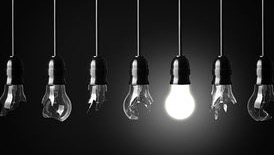What do Babe Ruth, Thomas Edison, Charles Darwin, Sigmund Freud and Henry Ford have in common? They’re all losers. In fact, they were all considered epic failures by going broke, striking out, having absurd ideas, etc. Yet, they’re each remembered primarily for their epic successes. They never gave up and they didn’t let themselves or others get in the way of what they envisioned.
I had been in business for some time when I heard a local business owner speak at an event. He said that when he and his colleagues get together, they are more inclined to speak about their failures rather than their successes. He explained that the failures offered more experience, wisdom and understanding of how the world works. It was through these experiences that most could pinpoint that the failure itself was the catalyst for something better.
Thomas Edison knew this. When asked how it felt to fail over 1,000 times before inventing the light bulb he replied that he hadn’t failed, but that the invention of the light bulb took 1,000 steps. In fact, many, if not most successful people embrace failure as a necessary progression. One of my favorite quotes comes from Thomas Watson Jr. who said, "The fastest way to succeed is to double your failure rate."
Don’t get me wrong, I’m not an advocate of failing on purpose, it’s just the usual way of reaching success. If you can try NOT to fail, but learn from WHY you failed, you’ll be more comfortable with your decisions.
I watched an interview with a police officer who was searching for moonshiners. He basically said the moonshiners had to be lucky all the time, but he only had to be lucky once. The same logic applies to success. My husband and I have been working on a business since 2006. It’s been difficult to move it forward, but we keep trying. We’ve received little support from others yet we persevere. Maybe it’ll be a success, maybe it won’t. But what I do know is that we won’t know unless we try and no one will get in the way of that effort.

 RSS Feed
RSS Feed